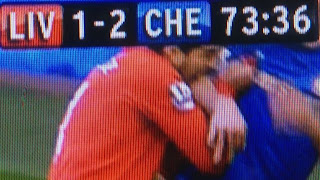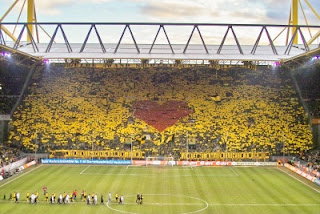@theonejoeyd
Luis Suarez knew it. Brendan Rodgers knew it. Liverpool's managing director Ian Ayre postponed a flight to Australia to deal with it. The Uruguayan maestro had made a serious heat of the moment gaffe.
His nibble on Branislav Ivanovic, unseen by referee Kevin Friend during the Reds' pulsating clash at Anfield against Chelsea on Sunday, has been punished by the FA with a 10-game suspension, which as I write this has yet to be appealed. Suarez pleaded guilty to the charge of violent conduct, but opposed a ban in excess of the standard three games.
 Now, Suarez does have a seven game ban for a bite during his stint in the Eredivisie at Ajax, and the Patrice Evra saga on his record, but racist abuse and violent conduct are two completely different kettles of fish and what the FA have demonstrated beyond belief is that racist abuse is not as serious as a gnaw on the arm. Try asking a black footballer what they'd rather be subjected to if they were forced to make an on-the-spot choice.
Now, Suarez does have a seven game ban for a bite during his stint in the Eredivisie at Ajax, and the Patrice Evra saga on his record, but racist abuse and violent conduct are two completely different kettles of fish and what the FA have demonstrated beyond belief is that racist abuse is not as serious as a gnaw on the arm. Try asking a black footballer what they'd rather be subjected to if they were forced to make an on-the-spot choice.
Of course, Suarez received eight games for the remarks made in his confrontation with Evra, while John Terry was given four for his comment at Anton Ferdinand. Let's not even take into account the 'build a bonfire' song about the Ferdinands that was boomed out by sections of England's traveIling support at San Marino last month that the FA bizarrely seems to be denying actually happened. It's the inconsistency and the reasoning behind their decisions that puzzle me into confusion. Indeed, when Wayne Rooney was slapped down with a three game ban for yes, violent conduct against Montenegro in the final Euro 2012 qualifier, they desperately attempted every single form of defence ever witnessed by any country's football association including a letter from Miodrag Dzudovic, the victim of Rooney's kick. How can they appeal that, yet slap down 10 games on Luis Suarez?
What is quite clear from observing him in interviews and the friendship he has struck with many of his team-mates is that Suarez is not the devil incarnate. He is here with his young family and is adapting to a new way of life, still learning the language. This is not defending either the comments at Evra or the bite at Ivanovic, but he clearly has a short fuse and instead of castigating one of the league's most gifted footballers, why can't the PFA provide him with the emotional support and assistance in trying to cure the problem? Liverpool have already assigned club psychiatrist Dr Steve Peters with the task of trying to calm him down. Too often it's easy to ignore and sneer at those who have issues to overcome when a bit of warmth and assistance can be the most fruitful cure.
There is an infectious disease sweeping the country not just in sport but in all walks of life- the rapid speed it takes for people to scream outrage and jump on a moral high horse. For me, what Suarez did on Sunday while unpleasant, was nowhere near the worst behaviour I've seen on a football pitch. Roy Keane on Alf-Inge Haaland in 2001, Callum McManaman on Massadio Haidara this season and going back to 1982 Harald Schumacher on Patrick Battiston, there's three I can recollect immediately. Breaking a fellow professional's leg and in some cases ending their career is not as severe an offence as a bite that left no lasting damage, by the looks of things.
Also, the identity of some of those individuals sticking the boot in brought to me a great sense of amusement and disbelief. Graeme Souness was apoplectic in the Sky Sports studio after the match and laid into the Uruguayan. He was at it again before the Borussia Dortmund-Real Madrid semi final when the ban was discussed in the studio, saying 'he had never seen anything like it on a football pitch.' Chortle! The same Graeme Souness who stamped on an opponent's nether regions when at Rangers and produced some of the most cynical, sordid challenges seen on a football field. The same former Liverpool manager who sold his story to the Sun newspaper, still passionately reviled in Merseyside, on April 15 of all days. Stop throwing those stones in your glass mansion Graeme.
And then we have the Prime Minister, David Cameron, who said the FA should take into account that 'high-profile players should be role models.' What, like expense-fiddling MPs? The same PM who appears to have vetoed Tanni Grey Thompson's Sport England position due to her vocal criticism of his austerity measures? Focus on your own problems, Dave.
Roy Keane, by all accounts, has not commented on the situation but I don't see his current employers ITV or any of the national tabloids bringing up the fact he deliberately set out to hurt someone, as his confession in his autobiography confirms. Is Suarez really more abhorrent and intolerable than that?
Luis Suarez has his baggage, and his behaviour on Sunday let his club and his manager down. But seriously, let's stop with the lynch mob mentality, and instead allow qualified people to aid him with his problems. If the Premier League wants to continue to keep pace with the ever-impressive Bundesliga and the already established La Liga, it cannot afford to lose its prized talents.
I only hope Suarez sorts his personal issues out, the FA weed out the hypocrisy and inconsistency over its disciplinary process, and the general baying mob of outrage wind their own necks in. However, my observation is that only the former is a realistic proposition.




